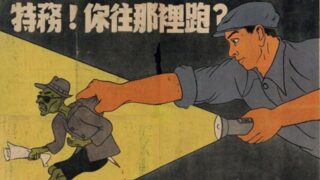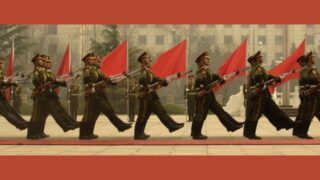When the state declares poverty no longer exists, what do you do with poor people? Hide them, warehouse them, keep them out of sight.
In 2015, at the Fifth Plenary Session of the 18th Chinese Communist Party (CCP) Central Committee, Xi Jinping promised that by 2020, “China will lift its rural impoverished population out of poverty by current standards, eliminate poverty from poverty-stricken counties, and alleviate overall regional poverty.” As the deadline approaches, local authorities are scrambling to meet target poverty levels set by Beijing. Poor, often elderly people are suffering great pain as they are being “helped,” often forced out of their homes and threatened with reprisal if they do not disappear from the government’s poverty statistics.
In response to the central government’s policy, Henan Province in central China began its battle against poverty with a goal of “rehabilitating” all 53 poverty-stricken counties and achieving overall poverty alleviation by 2019. According to the government’s standards issued in 2012, a county is designated as poverty-stricken when annual income per capita is less than 2,300 RMB (about $328).
In June 2018, Henan’s Poverty Alleviation Leading Group stated in its Notice on Launching the Operation of Accurate Poverty Alleviation With “School-Local Partnership Assistance,” “Our province’s poverty alleviation work has already shifted from the comprehensive advancement phase to the centralized general attack phase. The task of promptly achieving the overall poverty alleviation goal by 2020 is arduous and time is running out.”
What does that “general attack phase” look like? Ms. Zhang, an 80-year-old woman from rural Henan, recently learned when she found herself in an impossible situation.
In November 2018, personnel from the Office of Poverty Alleviation in Henan’s Shangqiu city appeared at Ms. Zhang’s door. Officials told her that inspectors from senior government offices would soon come to see her, and would likely ask what her income was. She was told she must tell the inspectors that her income was 9,800 RMB (about $1,400) per year, because “as long as this number is reached, their poverty relief task would be accomplished.”
In other words, the local government officials told her to lie to the state.
Ms. Zhang had some doubts: “I’m 80 years old. How could I have such a high annual income? Wouldn’t that be talking nonsense?”
The government personnel told her that if she did not answer the question as she had been instructed, her monthly pension of 200 RMB (about $28.5) would be revoked.
The elderly woman was so afraid of saying the wrong thing and having her pension revoked that she went to her son’s home to hide. However, personnel from the Office of Poverty Alleviation once again came to the door and threatened her, saying: “Even if you escape this inspection, you cannot escape from unannounced visits by higher levels of government.”
Ms. Zhang was constantly scared that officials would come to conduct an unannounced investigation and she would be unable to answer their questions, resulting in trouble for herself as well as her son.
“Poverty alleviation” should be a good thing. However, elderly people in Henan’s Huaiyang county, which is on the poverty-stricken list, have been tormented by the “poverty alleviation” policy.
One of the causes of their suffering is the new policy of “eating together, living together, and sharing a household”. Many elderly people in the countryside live alone, far from their children, in shabby houses with a very low income. As a result, they have been identified as impoverished households, and, therefore, have become an obstacle to completing the government’s “poverty alleviation” mission. To fix the problem, the authorities have instituted the policy of forcing children to take their parents in with them so that the combined household income would suddenly become enough to “pull the poor elderly out of poverty.” And magic happens – no more poor people!
Mr. Fang, a 78-year-old villager, experienced this magical poverty elimination strategy. He told Bitter Winter that in August 2018, government personnel demanded that he and his wife go and live at his son’s home. Mr. Fang told government personnel that his son works in another region, so there is no way they can live with him. The personnel, however, would not compromise.
Two days later, they demanded Mr. Fang’s son’s phone number, saying: “Tell your son to come and pick you up. Even if you don’t go, we will seal off the door to your house today, and you can look for another place to stay.” The officials sealed the door, took photos, and then left.
Mr. Fang and his wife, who watched helplessly as their own home was sealed off, said in tears, “We are being forced into a dead end. We have a home but aren’t allowed to stay there. We have no place to go at night.”
Driven to despair, the elderly couple had no choice but to make a hole in the wall of their house and crawl through it to enter and sleep. Before dawn, they got up and secretly made a small meal. After they finished eating, they hastily crawled out through the hole, fearing that they would be discovered by village officials.
In a similar story, the 79-year-old Ms. Li, another villager, also had her home forcibly sealed off by the authorities, and she was required to live with her son.
“I stayed at my son’s home for one night. I couldn’t sleep all night long,” Ms. Li said in tears. “Without talking things over with my daughter-in-law, the officials forced me to stay at their house. If she doesn’t let me stay, where will I live?”
Unwilling to live with her son’s family, Ms. Li made a hole in the wall of the house where she used to live and every night, she secretly went there to sleep. She knew that this was not a long-term solution.
Enduring such an anxiety-filled life in their own homes has caused misery for these elderly people. After being forced to move by village officials, a 70-year-old villager, Mr. Huang, was scared to the point of being “unable to eat or sleep,” and kept repeating: “Some people have come to arrest me. Some people have come to arrest me.”
A government insider said, “Huaiyang is designated by the state as a poverty-stricken county and must achieve poverty alleviation this year, or else the county Party secretary and county mayor will be punished. If elderly people and the households receiving the ‘Five Guarantees’ [a welfare support payment for low income households] are counted when calculating per capita income, the poverty alleviation standard can never be reached. If elderly people share a household with their children and their incomes are linked together, then the poverty alleviation standard can be met.”
One local resident commented, “The higher-ups [at province and state level] set the policies, and subordinates find ways to deal with them.”
According to local villagers, in order to encourage the poverty-alleviation-by-relocating-elderly-people-strategy, posters with the slogan “It is honorable to show filial respect to the elderly; it is shameful to abandon the elderly” have been posted throughout the county. The government does not allow elderly people to live alone. After an elderly person has been forced to live with their children, signs saying “Dangerous house under renovation” or “This house is uninhabited” are hung on the elderly person’s sealed-off house.
The slogan “It is honorable to show filial respect to the elderly; it is shameful to abandon the elderly,” which is posted to support the implementation of the poverty alleviation policy:
Such a poverty alleviation policy is not unique to Huaiyang county, as desperate poverty reduction policies have been launched in many parts of China.
Thus, elderly citizens are being forced out of their homes and into the arms of their children in order to “reduce poverty” by technicality. Other elderly Chinese, however, are being pushed out of their homes and into nursing homes. How does a nursing home reduce poverty?
The “Five Guarantees,” mentioned earlier, is a social security system implemented in China’s rural areas. The intended subsidy recipients are villagers who are elderly, handicapped or unable to work, or lack the means to make a living. Recipients can survive on the small subsidies, but they are not able to raise themselves out of poverty.
According to a quirk in the regulations, however, “Five-Guarantee households” that receive “centralized” support (such as that provided by nursing homes) are not categorized as impoverished households. On the other hand, “Five-Guarantee households” under decentralized support (at the own homes or in other situations) can be classified as impoverished households if their income is low (and it usually is) in order to qualify for the subsidy. Therefore, ripping members of these “Five-Guarantee households” out of private homes and forcing them into nursing homes and other institutions to receive centralized support has become another solution for “poverty alleviation.”
Last July, for example, a village in Huaiyang county was ordered to ensure that eight households received “centralized support at nursing homes.” If the order was not carried out, the village’s Party secretary would be held fully accountable.
Mr. Li, a villager who became one of the government’s targets said, “I won’t go. I have a home. My nephew’s wife is willing to provide for me.”
Village government officials threatened him. “Even if there are people providing for you, you still have to go to a nursing home.” The same day, Mr. Li’s house was forcibly sealed off.
In August, government officials ordered personnel to burn down the sheep-pen at Mr. Li’s home and arranged for people to sell Mr. Li’s sheep, forcing him to go and live at the nursing home.
As strange as it may seem, people like Mr. Li who have been able to move into nursing homes are often the fortunate ones. For those who are still secretly digging holes and returning to their homes to live, their days doing so will be numbered because the homes are very likely to be deemed “dilapidated buildings” and demolished.
According to sources, in late December 2018, some villages in Huaiyang county held a “mobilization meeting,” during which it was stated that since the county must eradicate poverty by March 2019, dilapidated houses must be demolished within a limited time period. Those who disobey or defy this order will be arrested. If a township has more than three dilapidated houses that have not been removed, the township secretary and mayor will be dismissed from office.
Many observers of Chinese life and government were not surprised by the absurdities of officials’ poverty reduction efforts. In 2015, a business professor at the University of South Carolina–Aiken, Frank Tian Xie, wrote in his article: “Can the CCP alleviate the poverty of 70 million people? The answer, of course, is no. What the CCP is doing now – for example, demanding that local government leaders write a guarantee to get the job done, and if poverty alleviation is not achieved, it will be their head on the chopping block. […] It is foreseeable that the most direct consequence of this policy is that these officials will engage in fraud; they will use all kinds of methods to engage in fraud at all levels of government. Thus, the result is that, apart from a new round of false figures regarding China’s economy, there will also be new falsifications constantly emerging with respect to politics and poverty alleviation.”
(All names of people who recounted their stories are pseudonyms.)
Reported by Gu Xi














